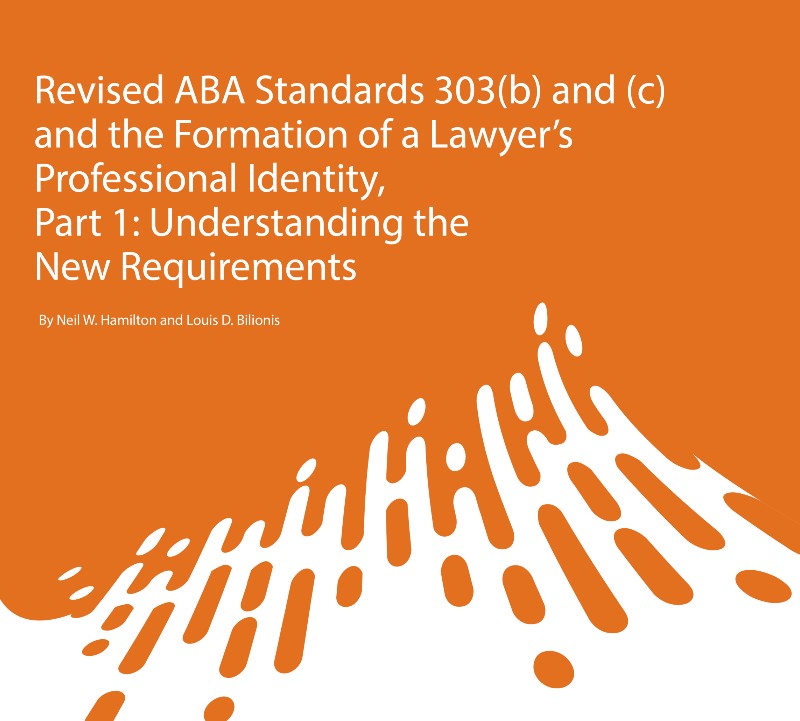By: Neil Hamilton, Holloran Professor of Law and Co-Director of the Holloran Center for Ethical Leadership in the Professions, University of St. Thomas School of Law
This short Holloran Center definition of student professional identity and the formation of a professional identity is the result of a process of inquiry, dialogue within the Center and with others nationally, and reflection since the founding of the Center in 2006. Starting in 2006, the Center focused on synthesizing the core values of the profession from the Preamble to the Model Rules, the three ABA reports and the Conference of Chief Justice Reports on Professionalism, legal scholars’ definitions of professionalism, and our study of how exemplary lawyers defined the core values of the profession.
Providentially, the Carnegie Foundation for the Advancement of Teaching published Educating Clergy, the first of its empirically-based studies of higher education for the professions in 2006, followed by Educating Lawyers in 2007, Educating Engineers in 2009, and Educating Nurses and Educating Physicians, in 2010. The Carnegie studies introduced “professional identity” and “professional formation” as central to each new entrant’s development in higher education for all of the professions including legal education.
By 2012, we thought that “professional identity” and “professional formation” were more useful than “professionalism” because: (1) they incorporated the same core values; (2) they were terms applicable across higher education for the professions which both increased their fundamental importance and meant that we could learn from higher education in the other professions; and (3) they avoided the narrow understanding of many practicing lawyers that “professionalism” was principally focused on respect for others.
Since 2012, the Center has been in a continuous process of further inquiry, dialogue, and reflection to create a short definition of professional identity and professional identity formation that emphasizes both the two most foundational core values of the legal profession (off of which all the other needed capacities and skills needed to practice law build), and also the journey for students to internalize and demonstrate the two foundational core values. Notably, the two foundational values are emphasized in every major faith tradition and nearly all of the major secular philosophies.
We have a consensus among the two co-directors, the associate director, and the three Holloran Center Fellows, and we offer this Holloran Center short definition of both professional identity and professional identity formation to inform your dialogue and reflection on the Standard 303 revisions.
What Is a Law Student’s Professional Identity and What Is Professional Identity Formation? — A Short Introduction
Holloran Center – September 2022
Generally speaking, professional identity is “a representation of self, achieved in stages over time, during which the characteristics, values, and norms of the … profession are internalized, resulting in an individual thinking, acting, and feeling like a … [member of the profession].”
For law students and lawyers more specifically, we can synthesize a succinct definition of professional identity from the Preamble to the Model Rules of Professional Conduct, the four major reports on professionalism from the ABA and the Conference of Chief Justices, and Holloran Center research. For law students and lawyers, professional identity is grounded in two foundational norms and values that law students and lawyers must understand, internalize, and demonstrate:
- a deep responsibility and commitment to serving clients, the profession, and the rule of law;
- a commitment to pro-active continuous professional development toward excellence at all the competencies needed to serve others well in the profession’s work.
“Professional identity formation” is a developmental process beginning in law school and extending over a career that “should involve an intentional exploration of the values, guiding principles, and well-being practices considered foundational to successful legal practice.”
Professional identity formation principally involves a process of socialization. The professional-to-be begins as an outsider to the professional community and its ways, values, and norms. Through experiences over time, inside and outside the classroom and the law school, the individual gradually becomes more and more an insider, “moving from a stance of observer on the outside or periphery of the practice through graduated stages toward becoming a skilled participant at the center of the action.”
The process continues throughout one’s career and features “a series of identity transformations that occur primarily during periods of transition” often marked by anxiety, stress, and risk for the developing professional. This process of socialization is a product of the developing lawyer’s social interactions and activities in environments authentic to the legal profession’s culture and enriched by coaching, mentoring, modeling, reflection, and other supportive strategies.
We hope this definition of professional identity and this description of professional identity formation can serve as a useful entry point for a law school’s faculty and staff interested in discussing and reflecting upon professional identity and professional identity formation in the context of the mission of the law school.
Please click below to view the definition with its endnotes.
Defining Professional Identity and Professional Identity Formation

Neil Hamilton is the Holloran Professor of Law and Co-Director of the Holloran Center for Ethical Leadership in the Professions at the University of St. Thomas School of Law in Minnesota.



